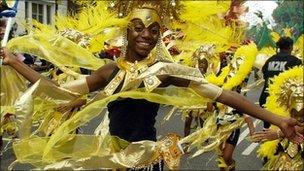Notting Hill Carnival's transformation over the years
- Published

Notting Hill Carnival has grown to become Europe's largest street party
When a feather-clad cast of several hundred danced to calypso beats through west London's streets for the first Notting Hill Carnival in 1964, few would have thought the event would develop into the vast and vivid expression of multiculturalism it is today.
"Can you imagine not having anything that is culturally yours in a country?" asked former carnival chairman Alex Pascal.
"We were still new to Britain and there was nothing more vibrant and exciting than the Notting Hill Carnival.
"It was the theatre that federated the Caribbean in Britain and the theatre that gave colours, creeds and races the opportunity to be together."
The carnival has grown from an essentially Trinidadian template of mobile steel bands, into Europe's largest street party, with performers embracing cultures from the Caribbean and beyond.
But most people agree it is still essentially Caribbean in nature.
"It's a Caribbean celebration, but also a welcoming place," said the Mercury Prize winning rapper Speech Debelle.
"It's a carnival of a Caribbean nature, that takes in the spectacles of all other cultures," said Mr Pascal.
And he encourages people from all backgrounds to join the mas costumed bands.
"Don't come to the carnival looking for mas. Come to carnival playing mas. Be part of it."
'Clubbing experience'
One area of the carnival that has certainly diversified in is its musical output.
From steel bands playing the sounds of calypso and soca, it has grown to embrace everything from soul and rap to house and funk.
Norman Jay, who has been running and DJing the Good Times sound system for 30 years, introduced the clubbing experience to carnival.
"In those days carnival was calypso and reggae music. I came there playing gay disco, jazz funk and John Coltrane records," he said.
"I crashed into Cambridge Gardens in 1980, set up my tiny sound system, put the first track on and the rest is history.
"Come one, come all. No matter your race, your colour, your creed or your sexual orientation, you are included."
Following the Notting Hill Carnival riots of 1976, organisers have worked more closely with the local authorities and the police.
But some feel too much policing may have dampened the carnival spirit.
'Togetherness'
"The authorities have a bit too much control now," said Keith Franklin, who has been running the KCC & Rocking Crew static soundsystem for 20 years.
"It seems like the participants are last on the list of their priorities.
"Security is needed but at times it can be a bit of an overkill.
"It can feel like you're having a party in front of your parents."
But Metropolitan Police carnival silver commander Mick Johnson, who will be working his 30th carnival this year, said: "The police and carnival organisers sit down together, to try to make it as safe and trouble free as possible.
"We give advice to the floats and they have to take it on board to be licensed.
"The health and safety culture that society has driven has meant we can't have too many pedestrians near the lorries."
Speech Debelle, who has been going to the event for 13 years, said: "We used to dance next to and hold on to floats with wheels as high as we were.
"You can't do that any more but I can understand the security reasons.
"Things have to change but they will still live on in people's memories."
Mr Pascal, who has been attending the carnival since its inception, said: "For all its sins, there is nothing else that offers this togetherness of people as the carnival.
"It's a credit to those who created it."
- Published26 August 2010
- Published18 August 2010
- Published5 August 2010